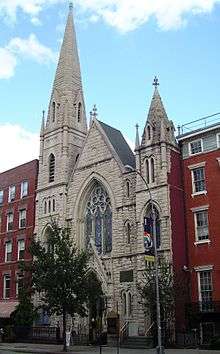Samuel B. Reed
| Samuel Burrage Reed | |
|---|---|
 | |
| Born |
January 7, 1834[1] Meriden, New Haven County, Connecticut[1] |
| Nationality | American |
| Other names | S. B. Reed |
| Known for | Architect |
Samuel Burrage Reed was an American architect of Corona, New York, and Woodcliff Lake, New Jersey. He was active in mid-to-late nineteeth-century and early twentieth-century America, particularly in New York State, New York City, and Connecticut.
Born in Meriden, Connecticut, he was first trained as a carpenter before becoming an architect. He is notable for designing several mansions, as well as public and ecclesiastical buildings.[1] Reed was a member of the American Institute of Architects (AIA).
Works
- 1903 – Passaic County Court House, Paterson, New Jersey.[2]
- 1891 – New Middle Collegiate Church, Second Avenue, New York City.[3]
- 1890 – Chester Wickwire House, Cortland, New York (now the 1890 House Museum).[1]
- 1888 – James Bailey House, Manhattan, New York City (of Barnum & Bailey Circus fame).[1][4]
- 1883 – John C. Reichert House, Tipton, Iowa.[1]
- Pinard Cottages, Newport, Rhode Island.[1]
References
Notes
- 1 2 3 4 5 6 7 C. Boggs, GenInfo
- ↑ "Passaic County Court House and Annex". New Jersey Historic Trust. Retrieved 2014-10-10.
- ↑ White, Norval & Willensky, Elliot (2000), AIA Guide to New York City (4th ed.), New York: Three Rivers Press, ISBN 978-0-8129-3107-5
- ↑ Norval White, Elliot Willensky with Fran Leadon, AIA Guide to New York City Fifth Ed. American Institute of Architects New York Chapter Series. (Oxford: Oxford University Press, 2010), p.516. ISBN 978-0-19-538386-7.
External links
 Media related to Samuel B. Reed at Wikimedia Commons
Media related to Samuel B. Reed at Wikimedia Commons
This article is issued from
Wikipedia.
The text is licensed under Creative Commons - Attribution - Sharealike.
Additional terms may apply for the media files.